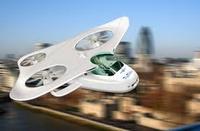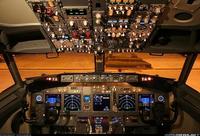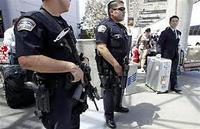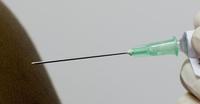-
Aviation industry under-prepared to deal with cyber risk: Expert
The aviation industry is behind the curve in terms of its response and readiness to the insidious threat posed by cyber criminality whether from criminals, terrorists, nation states, or hackers, according to Peter Armstrong, head of Cyber Strategy for Willis Group Holdings, the global risk adviser, insurance and reinsurance broker. Armstrong explained that the aviation industry’s under-preparedness is noteworthy in a sector that abhors uncertainty and works tirelessly to eradicate it.
-
-
Lawmakers want more security features to be added to Visa Waiver Program
The recent attacks in Paris have led U.S. lawmakers to propose restrictions on, or adding more security to, the U.S. Visa Waiver Program(VWP), which allows citizens from thirty-eight countries to travel to the United States for up to ninety days without obtaining a traditional visa. Concerns now revolve around the threat that some of the roughly 3,000 European nationals who have traveled to Syria to fight alongside Islamic extremist groups, and are now equipped with skills to launch an attack, may return to Europe and then book a flight to the United States to launch an attack.
-
-
EU Parliament considers reviving uniform air-passenger information legislation
The European Parliament is considering reviving draft legislation which would force airline companies to give EU member governments a cohesive and uniform set of passenger information, following heightened security concerns in the wake of the 7 January Paris attacks. The legislation, first proposed in 2011, was rejected bu the EU Parliament in 2013.
-
-
Building better butt bombs: Al Qaeda’s instructions to followers
Five years after using a “bum bomb” for the first time – on 28 August 2009, against the Saudi deputy interior minister – al Qaeda bomb makers are at it again. Having actively searched for new and better ways to take advantage of privacy (“don’t touch my junk”) considerations which govern airport security checks, one of the organization’s bomb makers goes public. The latest issue of Inspire, the organization’s English-language magazine, contains a detailed 22-page article on how to construct a butt bomb and conceal it in one’s anal cavity. The article alsoadvises would-be suicide bombers on where to sit on the airplane to ensure the most destruction, and also recommends using the hidden bomb for assassination attempts.
-
-
The science of airport bomb detection: chromatography
As the holidays draw near, many of us will hop on a plane to visit friends and family — or just get away from it all. Some will be subjected to a swab at the airport to test clothes and baggage for explosives. So how does this process work? The answer is chromatography — a branch of separation chemistry — along with mass spectrometry. Although instrumental chromatography is a mature technology (the first instruments were produced just after WWII), new applications frequently pop up. Some are a matter of scale. Pharmaceutical companies that produce monoclonal antibodies (often used in cancer treatments) make use of capture chromatography to purify their products. On an industrial scale these can be tens of centimeters in diameter and meters in length (typical lab scale systems are a few millimeters diameter and 5-30cm long). Other uses can either be in a specific new application, such as detecting cocaine on bank notes using the gas chromatography systems often seen at airports as bomb and drug detectors.
-
-
Helicopter steering innovation could herald new era for aerial transport

For decades, flying cars have featured in our visions of what futuristic cities might look like. Now EU-funded researchers with the MYCOPTER project have developed a steering system that makes helicopters as easy to control as cars. While having your own personal aerial vehicle (PAV) may still be some way off, the success of the project opens up the possibility that one day flying vehicles could indeed be an integral part of the urban transportation network.
-
-
FAA caught between commercial pressures, safety concerns in regulating drone use
Law enforcement agencies in major U.S. cities have expressed concerns about the possible use of drones by terrorists to launch bombs against key U.S. targets, including shopping malls, stadiums, and even banks. The FAA is in a tough spot, says one expert.”If they come out with rules that are not protective enough and then there’s some sort of an accident then they will be criticized for not having been more careful with this technology,” he says. “On the other hand, if they come out with rules that are viewed as overly restrictive in the name of safety then they are going to be criticized as impeding the growth of the industry, so it’s a very difficult balancing act that they have to navigate.”
-
-
Cockpit automation causes pilots to lose critical thinking skills

In the wake of recent airline crashes, major news networks have aired concerns about pilots’ ability to accurately fly “by hand” when the airplane’s cockpit automation systems fail. Although many of these concerns have centered on manual skills such as operating the airplane’s controls, new human factors/ergonomics research suggests that pilots’ thinking skills, such as navigating, remaining aware of the status of the flight, and diagnosing troublesome situations, are most vulnerable in today’s automated cockpits.
-
-
New terahertz device could strengthen security
We are all familiar with the hassles that accompany air travel. We shuffle through long lines, remove our shoes, and carry liquids in regulation-sized tubes. Even after all the effort, we still wonder whether these procedures are making us any safer. Now a new type of security detection that uses terahertz radiation is looking to prove its promise. Able to detect explosives, chemical agents, and dangerous biological substances from safe distances, devices using terahertz waves could make public spaces more secure than ever.
-
-
U.S. strike kills Khorasan Group’s chief bomb-maker
U.S. airstrikes in Syria overnight successfully hit a group of al-Qaeda-affiliated militants, killing the group’s top bomb-maker. David Drugeon, a French Islamist militant, was killed along with other Khorasan Group members near Saramada, a town eighteen miles northeast of Idlib in Syria’s northwest. Drugeon escaped an earlier U.S. airstrike, on 22 September, which was aimed to take him out. The innovative Drudgeon was designing bombs made out of clothing dipped in explosive solution and explosives concealed in personal electronics. In July, the Transportation Security Administration (TSA) banned cell phones without electronic charge from airplane cabins in response to the intelligence coming in about Drudgeon’s designs, much of it fragmentary.
-
-
Designing the air traffic control systems of tomorrow
On a good day, flying can be a comfortable and efficient way to travel. All too often, however, eather or overcbooking can cause delays that ripple through the system, inducing missed flights, anxiety, discomfort and lots of lost time and money. Things had gotten so out of whack that in 2003, Congress enacted a law designed to bring online a Next Generation — or NextGen — air traffic control system by January 2020. The Department of Transportation would require the majority of aircraft operating within U.S. airspace to be equipped with new technology to track and coordinate aircraft and would institute many other programs to improve air travel.
-
-
Japan to adopt automated airport gates equipped with facial recognition technology
More than eleven million people visited Japan last year, the highest on record, and the government is anticipating close to twenty million foreigners in 2020, the year Tokyo will host the Summer Olympics and Paralympics. Japan plans to adopt automated airport immigration gates supported by facial recognition technology, because while the number of foreign visitors continues to increase, the number of immigration officers remains limited, or even shrinks. A general concern with using facial recognition technology at immigration gates is that passports can be valid for a decade, while a person’s appearance may change within that timeframe. Another concern with the proposed system is how facial data image collected will be stored or erased.
-
-
U.S. tightens scrutiny of U.S.-bound airline passengers

Roughly 1,000 of the 4,000 fighters who traveled to Syria and Iraq to join ISIS carry passports of one of the thirty-eight Visa Waiver Program countries – countries whose citizens do not need a visa to enter the United States. U.S. officials are now reviewing methods used to screen airline passengers with passports from Visa Waiver countries before they board U.S.-bound flights.
-
-
U.S. air marshal in quarantine after suspected Ebola syringe attack at Lagos airport

An American federal air marshal was placed in quarantine in Houston, Texas yesterday after being attacked Sunday night at the Lagos, Nigeria airport. The assailant wielded a syringe which contained an unknown substance, and was able to inject an unknown substance into the back of one of the air marshal’s arms. The marshal was able to board the United Airlines flight to Houston, where he was met by FBI agents and health workers from the Centers for Disease Control (CDC).
-
-
Security flaws found in backscatter X-ray scanners
A team of researchers has discovered several security vulnerabilities in full-body backscatter X-ray scanners deployed to U.S. airports between 2009 and 2013. Secure 1000 scanners were removed from airports in 2013 due to privacy concerns, and are now being repurposed to jails, courthouses, and other government facilities. “The system’s designers seem to have assumed that attackers would not have access to a Secure 1000 to test and refine their attacks,” said one of the researchers. The researchers, however, were able to purchase a government-surplus machine found on eBay and subject it to laboratory testing.
-
More headlines
The long view
New Technology is Keeping the Skies Safe
DHS S&T Baggage, Cargo, and People Screening (BCP) Program develops state-of-the-art screening solutions to help secure airspace, communities, and borders
